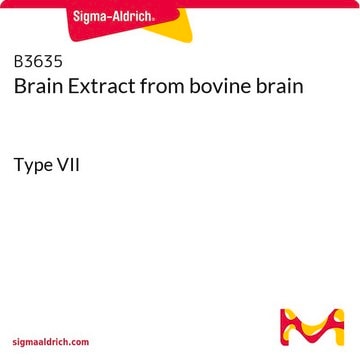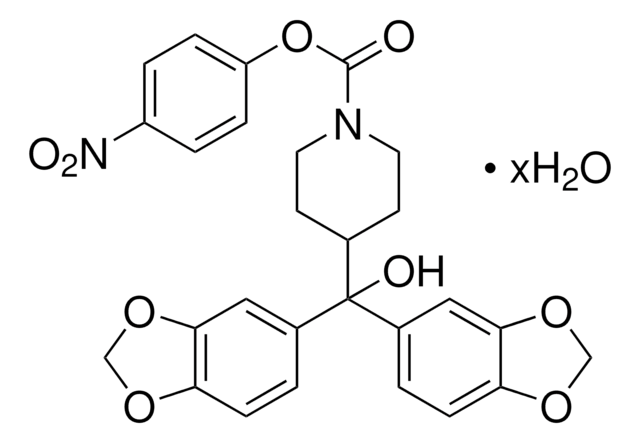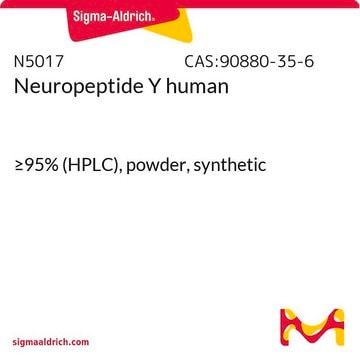B1502
Brain Extract from bovine brain
Type I, Folch Fraction I
Synonym(s):
Brain Extract from Bovine
Sign Into View Organizational & Contract Pricing
All Photos(1)
About This Item
UNSPSC Code:
12352211
NACRES:
NA.25
Recommended Products
biological source
bovine brain
Quality Level
type
Type I
form
powder
lipid type
phosphoglycerides
storage temp.
−20°C
Looking for similar products? Visit Product Comparison Guide
General description
Brain extract has lipids, especially polyunsaturated fatty acids (PUFAs) at high level. Extract from substantia niagra and the striatum has high amount of iron.
Application
Brain Extract from bovine brain has been used:
- to prepare small unilamellar vesicles
- in lipid binding assay
- to aid the recovery of phosphoinositides and also to terminate the reaction in phosphatidylinositol 5-phosphate (PtdIns5P) and PtdIns4P assay
- in liposome and protein self-aggregation assays
Biochem/physiol Actions
Brain lipids are involved in cellular signal transduction, membrane organization, trafficking protein modification, interactions and energy storage.
Packaging
Sealed ampule.
Components
Contains phosphatidylinositol phosphatidylserine,other brain lipids.
Storage Class Code
11 - Combustible Solids
WGK
WGK 3
Flash Point(F)
Not applicable
Flash Point(C)
Not applicable
Personal Protective Equipment
dust mask type N95 (US), Eyeshields, Gloves
Certificates of Analysis (COA)
Search for Certificates of Analysis (COA) by entering the products Lot/Batch Number. Lot and Batch Numbers can be found on a product’s label following the words ‘Lot’ or ‘Batch’.
Already Own This Product?
Find documentation for the products that you have recently purchased in the Document Library.
Customers Also Viewed
Cholesterol and Fat Metabolism in Alzheimer?s Disease
Drug Discovery Approaches for the Treatment of Neurodegenerative Disorders, 161-193 (2017)
Measurement of phosphoinositides in the zebrafish Danio rerio
Jones DR, et al.
Nature Protocols, 8(6), 1058-1058 (2013)
Lipid binding regulates synaptic targeting of PICK1, AMPA receptor trafficking, and synaptic plasticity
Jin W, et al.
The Journal of Neuroscience, 26, 2380-2390 (2006)
Structure and dynamics of helix-0 of the N-BAR domain in lipid micelles and bilayers
Low C, et al.
Biophysical Journal, 95(9), 4315-4323 (2008)
Matthew J Buccilli et al.
Cells, 8(7) (2019-07-25)
Copines make up a family of calcium-dependent, phospholipid-binding proteins found in numerous eukaryotic organisms. Copine proteins consist of two C2 domains at the N-terminus followed by an A domain similar to the von Willebrand A domain found in integrins. We
Our team of scientists has experience in all areas of research including Life Science, Material Science, Chemical Synthesis, Chromatography, Analytical and many others.
Contact Technical Service

![Guanosine 5′-[γ-thio]triphosphate tetralithium salt ≥90% (contains < 10% GDP, HPLC), powder](/deepweb/assets/sigmaaldrich/product/structures/131/514/e3025b6a-cb52-4818-b20f-98efac485c1a/640/e3025b6a-cb52-4818-b20f-98efac485c1a.png)







